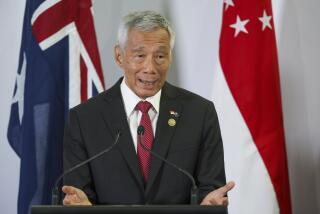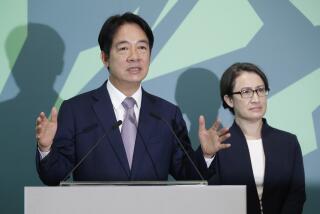Hong Kong Race May Be Over
- Share via
BEIJING — Career civil servant Donald Tsang announced Wednesday that he had secured nominations from most members of the Beijing-backed election committee, assuring that he will become Hong Kong’s next leader.
Tsang said he had received nominations from 710 of the 796 voters from the panel, which had been scheduled to name a new territorial leader next month. An official announcement confirming his selection was expected as early as today.
Tsang’s two rivals had already dropped out of the race, failing to receive the minimum 100 nominations required to run.
“The process was very smooth,” Tsang told reporters at his campaign office. “I’m very excited.”
Direct election of Hong Kong’s leader has never been part of life in the former British colony. Although China promised a degree of autonomy when it resumed control of the territory in 1997, the chief executive is chosen by the election committee, whose membership is largely determined by Beijing.
“The Chinese authorities like elections, provided they know the result in advance,” said Law Yuk-kai, director of the Hong Kong Human Rights Monitor. “Tsang’s so-called election is a case in point. It’s purely cosmetic.”
Tsang’s victory fills a power vacuum created with the resignation this year of the territory’s first leader after the hand-over, shipping magnate Tung Chee-hwa. The tycoon showed few political skills and had become unpopular with both the Hong Kong people and the Beijing authorities who had appointed him.
Tsang, who has served four decades in Hong Kong government, is widely seen as an improvement.
“There is no question he’s going to be a better leader, that’s a no-brainer,” said Michael DeGolyer, the director of the Hong Kong Transition Project at Hong Kong Baptist University. “Why is he better? Number one, because he is not Tung Chee-hwa. Number two, because he is not Tung Chee-hwa.”
In many ways, the bow tie-wearing Tsang does not fit the profile of a typical pro-Beijing politician. He is not a deep-pocketed businessman. The son of a police officer, he was made a knight of the British Empire by Prince Charles. Tsang is also a devout Roman Catholic who famously attends church daily.
However, Tsang’s experience as the territory’s financial secretary and in other positions in the government gives him strong credentials for dealing with the economy and civil service.
“This proves Beijing wants two things from Hong Kong: money and no trouble,” DeGolyer said. “The best person to hand them that is Tsang.”
Tsang has been acting chief executive since March.
His political opponents have questioned his role in the widely perceived failures of the Tung administration, during which Tsang served as second and third in command.
“We hope that by declaring our interest in running for the post, we can force him to make pledges about what he intends to do for Hong Kong and how he will regain the confidence of the people,” then-candidate Chim Pui-chung said on Hong Kong radio last month.
Tsang’s two opponents, Chim and pro-democracy legislator Lee Wing-tat, called for a public debate. But the acting leader never agreed to one, saying his rivals hadn’t lined up enough votes to qualify as candidates.
Now Tsang must find a way to navigate potential conflicts between his Beijing masters and Hong Kong residents.
On critical issues such as the push by activists for greater democracy, Tsang is unlikely to offend Beijing.
“Universal suffrage, forget about it,” said Law, of the rights group. “Beijing tells us Hong Kong is not prepared for it. But most people in Hong Kong know it is Beijing that is not prepared.”
More to Read
Sign up for Essential California
The most important California stories and recommendations in your inbox every morning.
You may occasionally receive promotional content from the Los Angeles Times.













